In recent years, the world of gaming has witnessed a great transformation. Gaming is no longer limited to specific communities; it has grown into a global trend, attracting players from all over the world. One game that has played an important role in this democratisation of gaming is Ludo. From being a traditional board game played in households to its digital avatar on real-money Ludo App gaming platforms, the Ludo game has evolved and captured the attention of a large audience. This article examines the inclusive nature of real money gaming platforms, focusing on the accessibility and opportunities they provide to different audiences.
Inclusivity – A Closer Look at Real-Money Games Platforms
Accessibility stands out as a fundamental pillar of inclusivity, especially when it comes to real-money games platforms. These platforms have played a significant role in breaking down barriers and democratising the gaming experience. As a result, they have created opportunities for participation not just for various age groups and backgrounds but also for individuals with disabilities.
Real-money games platforms have gone a long way in dismantling the limitations imposed by physical presence, making it possible for a diverse range of players to engage in tournaments and competitions. However, when we examine inclusivity through the lens of accessibility for people with disabilities, it becomes crucial to consider the various challenges they may face.
These platforms often provide a user-friendly interface, a feature that serves players of all skill levels. This not only ensures that newbies and experts alike can manage and enjoy the game but also significantly benefits individuals with disabilities. Features such as customisable controls, voice commands, and screen reader compatibility can make real-money games more accessible to those with mobility impairments or visual and auditory challenges.
Furthermore, the inclusivity of these platforms extends to language diversity, allowing players from different linguistic backgrounds to interact effortlessly. However, it is essential to stress that inclusivity should encompass more than just linguistic diversity; it should also address the specific needs and preferences of individuals with disabilities.
The Social Impact of Real-Money Gaming
Beyond its economic implications, real-money gaming has also made a positive social impact. The communal nature of the game encourages social interaction and bonding. Friends and family members can connect, compete, and share moments of joy, irrespective of physical distance.
The inclusivity of real-money gaming is further evident in the diverse player base it has attracted. Gamers from different age groups, professions, and backgrounds come together in the virtual world, developing a sense of unity and community. This aspect of the game extends beyond the digital realm, influencing positive social dynamics in the real world.
Opportunities for Skill Improvement and Competition
Real-money games platforms not only offer entertainment but also provide opportunities for skill improvement. Players can compete against opponents from around the world, honing their strategic thinking and decision-making skills. The competitive nature of real-money gaming adds an extra layer of excitement, making it a thrilling experience for enthusiasts.
Moreover, these platforms often host tournaments with substantial prizes, creating an incentive for players to improve their skills. This aspect of real-money gaming adds an element of seriousness and dedication to the game, attracting a segment of the audience that seeks more than just casual entertainment.
Addressing Concerns: Responsible Gaming Practices
While real-money games platforms have opened up exciting opportunities, concerns about responsible gaming practices cannot be ignored. Inclusivity should not come at the cost of players’ well-being. Reputable platforms incorporate measures to promote responsible gaming, including setting deposit limits, providing self-exclusion options, and offering resources for those seeking help with possible health-related issues.
Ensuring that these platforms adhere to stringent regulations and ethical practices is crucial for maintaining a healthy gaming ecosystem. This ensures that inclusivity is not compromised, and gaming remains an enjoyable and responsible activity for all participants.
The Future of Inclusive Gaming
The inclusivity of real-money games has opened new doors in the gaming industry, setting the stage for a future where gaming is truly for everyone. As technology continues to advance and real-money gaming platforms innovate, the opportunity for even greater inclusivity becomes clear.
The positive socio-economic impact of real-money gaming has sparked discussions about the broader role gaming can play in society. Beyond entertainment, gaming has the potential to contribute to education, skill development, and community building. Real money Ludo game, with its widespread appeal, is at the forefront of this transformative wave.
The Bottom Line
In conclusion, while real-money games platforms have made significant gains in fostering inclusivity across age, background, and geography, there is a growing need to improve accessibility for individuals with disabilities. By implementing features that serve a wider range of abilities and providing an inclusive environment, these platforms can truly embrace the spirit of inclusivity and ensure that everyone, regardless of their physical abilities, can participate and enjoy the gaming experience.







